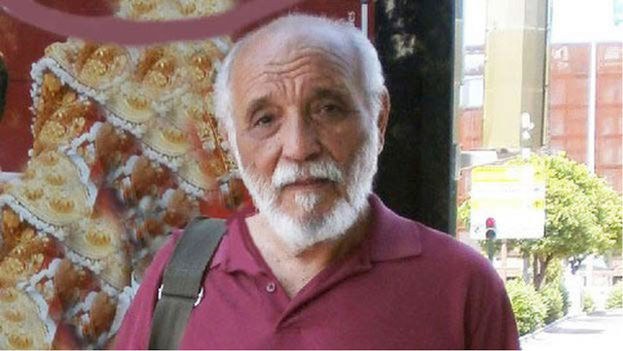
![]() 14ymedio, Havana, 20 June 2018 — Ten days after his 85th birthday and after a long battle with cancer, the poet Rafael Alcides died at his home in Nuevo Vedado on Tuesday afternoon, his son Rafael confirmed to 14ymedio. Sources close to the family explained that there will be no funeral and that his ashes will be scattered in Barrancas, in the east of the island, where he was born on 9 June 1933.
14ymedio, Havana, 20 June 2018 — Ten days after his 85th birthday and after a long battle with cancer, the poet Rafael Alcides died at his home in Nuevo Vedado on Tuesday afternoon, his son Rafael confirmed to 14ymedio. Sources close to the family explained that there will be no funeral and that his ashes will be scattered in Barrancas, in the east of the island, where he was born on 9 June 1933.
“He did not like tributes,” says filmmaker Miguel Coyula and author of the documentary Nadie, based on an interview with Alcides that lasted more than two hours. With this work, presented in the independent gallery El Círculo in Havana, Coyula addressed the biography of the poet and novelist, especially his long years as a censored writer.
Rafael Alcides began his literary career with the magazine Ciclón (Cyclone) and successfully published some 60 books, including Himnos de montaña (Mountain Hymns) (1961) and La pata de palo (The Wooden Leg) (1967).
He began his fall from grace with the regime when, in the 80s, the poet set aside ideology and expanded to less political issues, publishing Agradecido como un perro (Grateful as a Dog) (1983), Y se mueren y vuelven y se mueren (They Die and Come Back and Die Again ) (1988), Noche en el recuerdo (A Night to Remember) (1989), Nadie (Nobody) (1993).
By 1983, when his poetry collection Agradecido como un perro appeared, the author had already suffered, for decades, the institutional silence that greeted his work, because of his openly critical positions on the Cuban Government.
From 1993 on, he abandoned all publishing collaborations on the Island and in 2011 he won the Breton Café & Bodegas Olarra de Prosa Española Award.
In 2014 his books published in Spain were seized from his wife, the blogger Regina Coyula, every time she tried to bring them into Cuba. For this reason he submitted his resignation from the Union of Writers and Artists of Cuba (UNEAC), which he had been a member of for years, saying that banning from the island his books published abroad was the same thing as banning him as author.
The poet published a letter, which he addressed to Miguel Barnet (president of UNEAC), in which he explained his reasons and returned the Commemorative Medal of the 50th anniversary of the UNEAC, which he had been granted as a founder of that government institution.
The letter to Barnet makes clear the ideological disenchantment of one of the most important poets of the 50s Generation: “Among these memories are those of the good friends I made among the members of the Association back then, treasures of my youth that are all that remain of that great, failed dream, people I love though they do not think the way I do, and who love me also, even if they dare not visit me.”
In speaking of the writer and poet, Cuban writer Virgilio López Lemus says that when Alcides published Agradecido como un perro he became a reference poet for the generations born between 1946 and 1970. López Lemus describes this work as a “long and intense poem in which the lyrical subject appears in a confessional attitude and at the same time as a witness, where he includes social life, family life, love and friendship (or is it one of the two?), and above all the warmth of a man who expresses himself with his skin open to the world, whether he receives wounds or caresses.”
____________________________
The 14ymedio team is committed to serious journalism that reflects the reality of deep Cuba. Thank you for joining us on this long road. We invite you to continue supporting us, but this time by becoming a member of 14ymedio. Together we can continue to transform journalism in Cuba.
